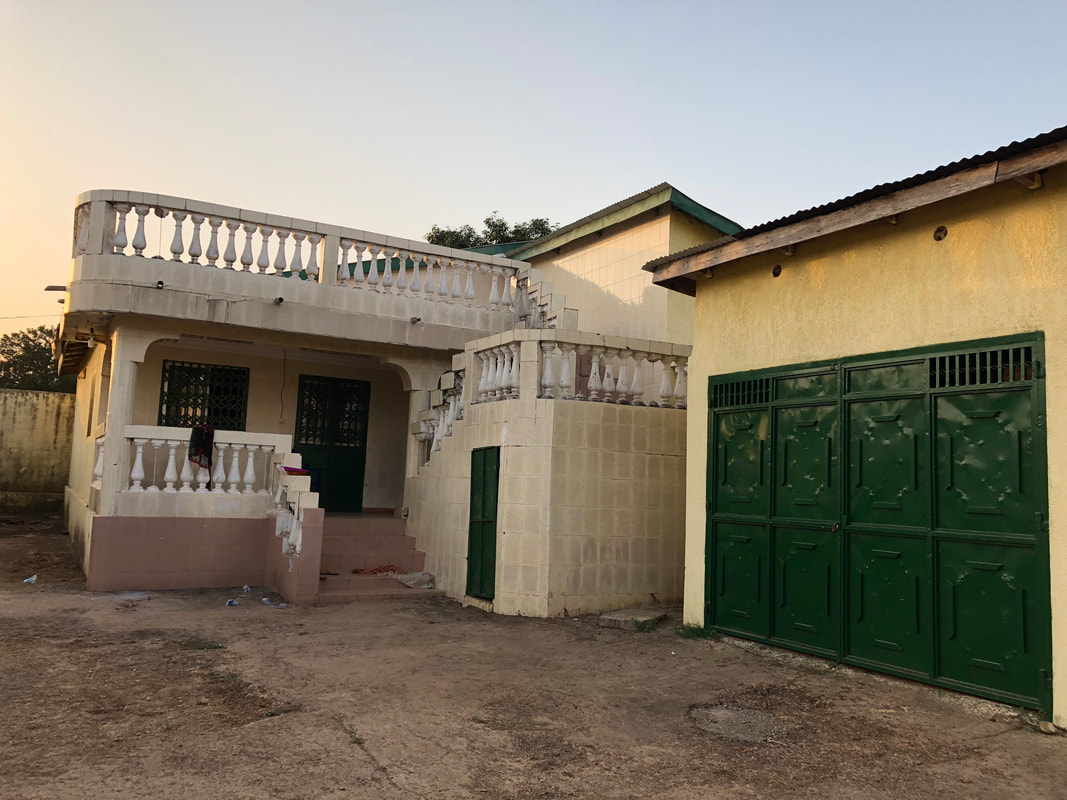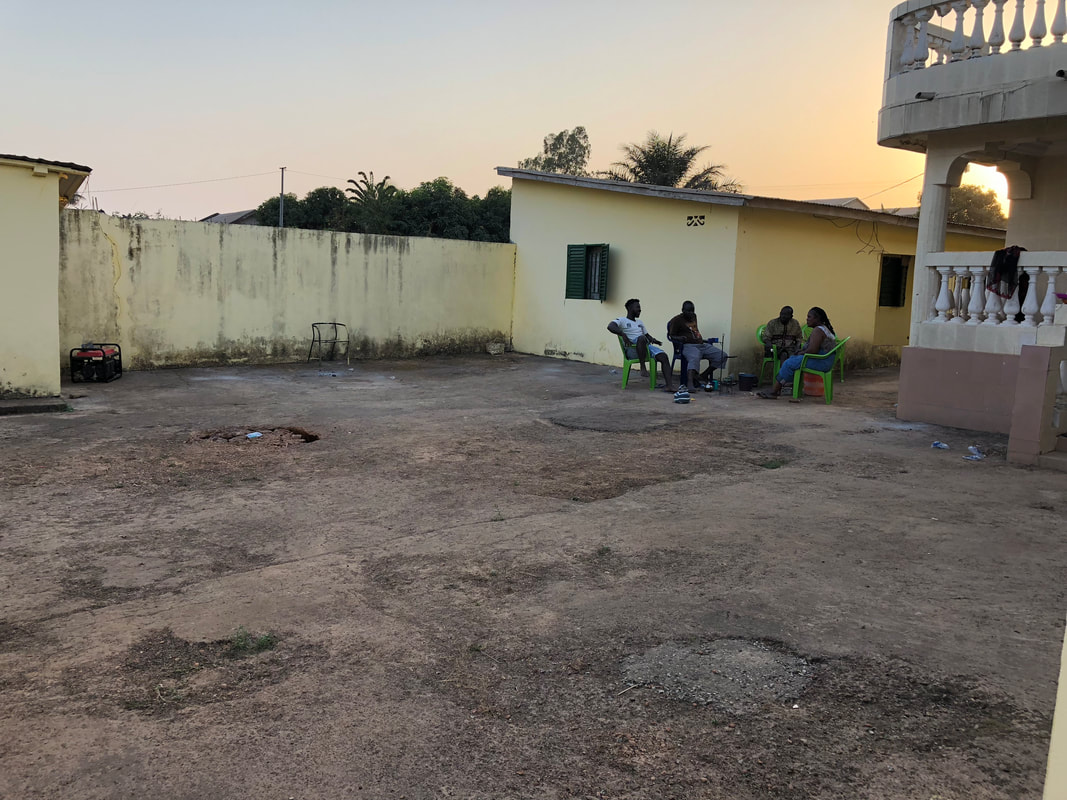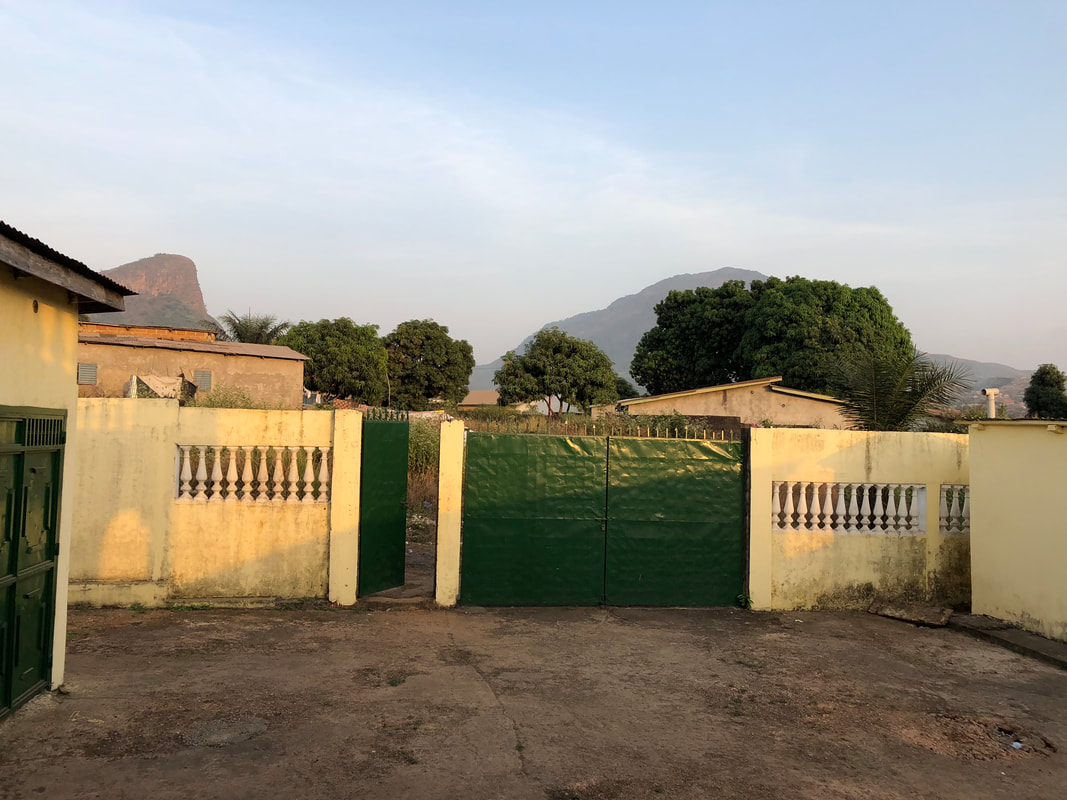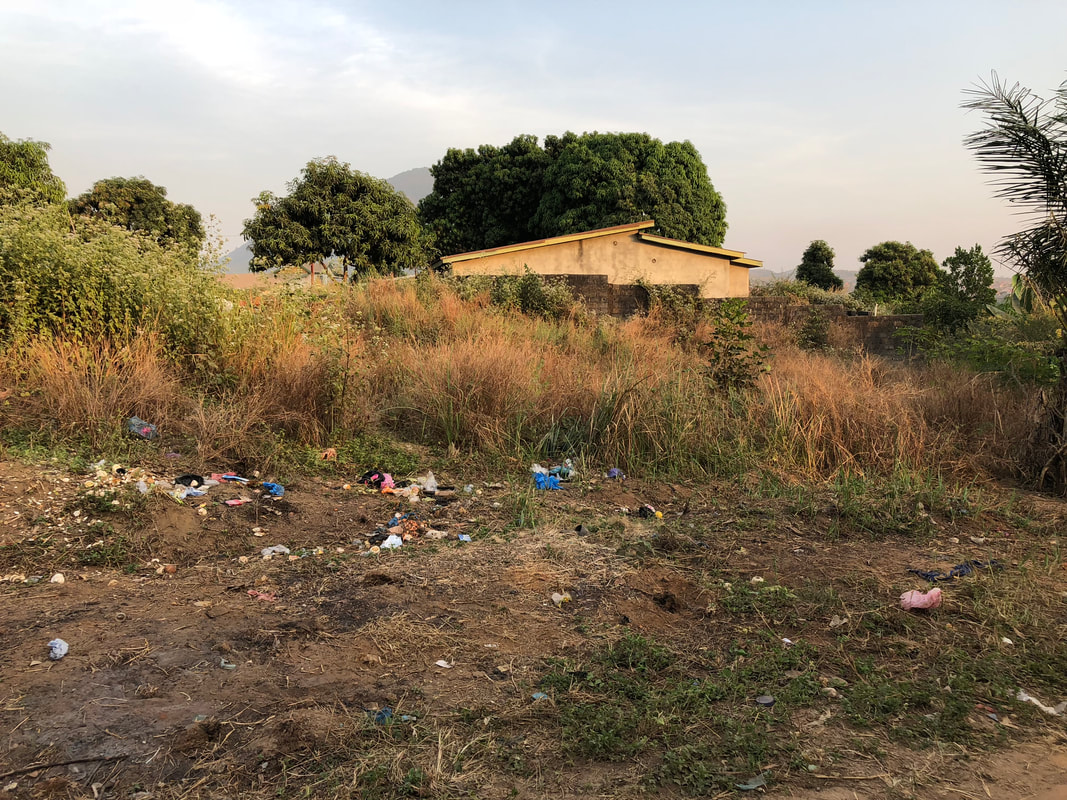|
In addition to what was laid out in Part One of this post, “the plastic situation” was the other big factor playing a role in how I was feeling about being in Guinea. There were several aspects to this, many of which I could deal with for some time, but ultimately… I found that I just couldn’t hang with the plastic-burning fumes. I had known about and expected the burning of the trash, plastic and all – and I had actually already gotten a bit used to this in Ghana. Maybe I could have lived with that (and other pollutants that I usually manage to steer clear of, like the occasional cigarette now being smoked in the courtyard…), and maybe I also could have dealt with the generally prolific use of plastic bags – the fact that every single time anything was brought to the house, often for me (as, again, the language barrier amounted to a lack of independence – no shopping for my own fruit at the market), it was brought in yet another plastic bag…
Just like in Ghana, the discarded plastic bags were everywhere here, a part of the landscape. And this didn’t bother me. The plastic everywhere didn’t even look like “litter” here; it just looked like… something that existed in this world, alongside grasses and trees and birds and goats and humans… One of the things I had always so loved about living in Ghana was how real it was there. For one thing, I loved how real my own life seemed to become without all the many distractions with which I had grown up – the television or movies, or even libraries full of books to read – as if (at least for someone as smitten with story as I am) one’s own story becomes the story without so many other stories to interfere. And I loved how another aspect of this “real” factor was that things were more out in the open there, more blatant or obvious – whether the corruption of the government, the trash situation, or the mystic workings of one’s own beautiful life. As for the trash… here in America, I think for most of us our trash tends to be “out of sight, out of mind” – sent off to some landfill where, unless we are one of the unfortunate souls living near it, we don’t have to be reminded of it; for most Americans, someone comes to pick up our trash for us and it disappears from our little realities. And though more and more of us are now aware of the evidence flooding in that in fact our trash ends up wreaking havoc on so very many of the creatures of this world, whether they be of land, sea, or sky… I think we perhaps still like to think of our trash being in some safe place, and moreover that all this plastic we use is okay, too, because when we’re done with it, we stick it in a recycling bin. Never mind the carbon footprint involved with the recycling process itself, in which our recyclables are mainly shipped to the other side of the world, or the fact that now most of the countries that used to do the recycling job for us are no longer even taking most plastics – so they are often not even being recycled at all, but just rediverted to landfills or incinerators… “Out of sight, out of mind,” right? …But in Ghana and in Guinea, and I would imagine probably in much of the rest of West Africa as well, there are no such illusions, and the trash produced can be seen all around – just part of the landscape. On my first day in Guinea, I discovered where our trash went – right out in the bush in front of the gate to the compound (great, at least, for fruit peels, which the goats would eventually wander over and consume). And as I stood gazing upon not only so much trash, but also the big burn marks on the dirt road where piles of the trash had clearly been set ablaze… I suddenly somehow reached a new level of feeling at peace with the burning of the trash, plastic and all. It felt like hitting upon a pinnacle in the experience of nonjudgment, a clarity of nonduality – no good or bad – this is just the way it is. …No good or bad, just the way it is – to see the whole plastic situation in this way, to experience it this way, felt like a real accomplishment for me. …But coming to this point of view did not mean that I personally wanted to choose to contribute any more than my usual amount of pollution to this planet (the amount that I have come to accept as the best I am willing to do as I travel through my life in the modern world – many compromises of my lofty ideals of sustainable living having been struck along the way). It’s one thing to observe all that trash in the landscape and feel fully accepting of it, at peace with it, but it’s another thing to participate after nearly a lifetime of efforts to live as eco-friendly as reasonably possible. And it’s also one thing to see the plastic all around me and quite another to actually breathe the fumes from it burning. And now I’m not talking about just the kind of burning outside in the general vicinity that I had already become used to, but suddenly a much more intense burning, just outside my window… I think I hit a turning point when a coal stove was brought to the courtyard, mostly for the men to use to make tea, as their food (nearly always rice with sauce) was cooked by a woman in town, and I saw – and smelled – the method of lighting the coal – which was to use knotted-up plastic bags as the kindling. Wow those fumes were toxic! I couldn’t hang with it – if I was too close or downwind, I’d have that awful feeling of brain-fry… For my own fires, I used scraps of paper to get the coal lit – as a writer, I always have used-up scraps of paper around. But outside the realm of my own room, everywhere else, all around me… no paper and plenty of plastic – plastic everywhere. If someone had to go out to get some kindling to light a fire… it wasn’t sticks and leaves that were brought back, it was sticks and plastic bags. But most of the time no one even had to go fetch kindling, because usually any time the stove was lit, there would be a small amount of fresh coal brought to the courtyard – in a plastic bag – which then became the kindling. Most of the friends who had been there had told me how “rough” Guinea was. And this had made me imagine less Western development, dirt roads and simple living – something a little closer to how I had previously been living in Ghana. And as that had been my favorite way to live out of all the ways that I have experienced so far in this life, it sounded appealing. But this other sort of “roughness” I now found was certainly not something I had imagined, and it surely was not at all appealing to me. …So what to do about it? …I knew from my past in Ghana that implementing change is generally a long, slow process. Even to get Koro to refrain from taking plastic bags at the market had been quite the battle – because he didn’t want all the women selling produce to look at him like he was crazy. In the two weeks I had just spent in Ghana, it had actually felt like some small improvement in the consciousness around plastic might have been made over all these years I was away, simply because, although all the women from whom I bought produce started to put everything in plastic bags, they didn’t act surprised or make any kind of fuss when I told them “no bag” and put everything in my cloth bags from home; this was an improvement over the reaction I had gotten 18 years before. But unlike back in Ghana, here in Guinea, where I was not doing my own shopping due to the language barrier (and where one trip to the market – accompanied, of course, by Alisco’s nephew Mohammed – was honestly enough for me, as it was so enormous and crowded and busy and crazy that I really had no desire to go back), the plastic bags just kept coming, every single time anyone was sent for fruit, or a bottle of water, etc.; and this just did not sit well with me. (And what to do about drinking water was another issue, with impacts on both my health and environment – but I will spare you the details on that one.) Here, where I was not only a guest but eventually even began to feel almost like a pet – a creature who was loved and well cared for, and who loved those caring for her, but was unable to communicate much more than love and gratitude (“thank you” was the first phrase I learned in Susu, and it was by far the one I used the most often), I in no way felt that it was my place to initiate some kind of change. I am not one who loves to have so much done for me, so already I was not in the most comfortable position, and to ask the people caring for me to change their whole way of doing things definitely seemed too much to ask – especially when it came to lighting the coal stove with plastic bags, which was the biggest issue for me, as there were so many different men using that stove, making tea on it numerous times a day. Not to mention that I couldn’t even speak a common language with anyone besides Alisco to even begin a discussion about all this! And Alisco was so busy with family matters in Conakry that I wasn’t looking to add to his load – I tried to burden him with my own needs as little as possible. I also got the very strong impression that amongst the people surrounding me, there was zero idea of single-use plastics being a not-so-good thing. Besides the steady flow of plastic shopping bags making their way to the house, there was one other thing I saw happening with the single-use plastics that I found particularly striking. In West Africa, in addition to the spring or other types of water sold in plastic bottles, there are little plastic bags of purified water for sale, which I would imagine the people around me were sometimes buying because they were being sold cold, as these were the same people who also were drinking the local water straight from the wells – so I doubt that it was a purity issue that prompted them to buy this other water. But they would also use that bagged water to rinse things off or wash their hands – the same exact things for which they would use the well water; it seemed to be that whatever was most within reach was what was used. All those little plastic bags, thrown empty onto the ground, would eventually be swept out into the bush along with the rest of the trash, and all of that eventually would be burned. This is how things are done. And I could accept that – did accept that. But it was also a difficult position in which to be: eco-conscious, culture-conscious, conscious of that old worn-out Western “we know better” mentality, conscious of all that privilege inherent in my upbringing in the West (and unconscious of plenty aspects of it as well, I’m sure)… and just watching the plastic bags build up – much of which was because of me, totally dependent on my hosts. And ultimately, the routine burning of plastic right in the courtyard… and that feeling of brain-fry… that much was definitely not okay with me. I am not one to mess around with my health; health and wellness are much of why I live the way I live, why I do the things I do – as most of you know, I’m all about self-care. And I am not one to linger in a situation I find to be unhealthy, if there’s an option for an exit. And so I didn’t. By the second week, I had had enough and was making plans for my departure. (And the scary thing was, while the toxic fumes were initially the biggest factor in my decision not to stay, by the time I left, the lack of peace and quiet seemed a much more pressing issue – I had gotten somewhat used to all the burning plastic, which did not at all seem like a good thing.) I knew that what felt most important for me to do at that point was to continue to focus on the writing, and in this way process my experience in Ghana. I had so loved being alone in Ghana, and having so much time purely to myself to write, and I could see now that for so long, just as I had been yearning to be in Africa again, I had been yearning for uninterrupted time for the writing work, had long felt overdue for this type of inward, reflective period. I had intended to spend just a few weeks at my mom’s house in the suburbs of Chicago on my way back to California, but now, deeply craving more time alone – quiet time alone, I could see that, at this time, the best place for me to find that, and to most easily be able to do the writing work, would actually be there, where I always felt rather “in the cave,” and where I had, for quite some time, been wanting a long stretch anyhow. And so I began to plan my early return (which was not so easy with no internet service – big thanks to my amazing mom (who was beyond overjoyed that I did not want to stay in Guinea) for arranging my plane ticket back). As for the trip to Guinea… I simply felt like there was always something I had needed to do – and now I had done it. And if I didn’t feel to stay, I did not need to stay. It did feel a little surprising, though, that I did not feel at all disappointed about this situation not being the right fit for me. (Seeing the disappointment on the faces of others, however – Alisco’s nephews, etc. – these guys I loved, was the one thing that made it just a little hard to leave…) On the contrary, I just felt a huge sense of freedom. There was a relief in having played out the intentions I had had for so many years, to now be free of them, to say goodbye to some vague visions I had had about Guinea just as I had said goodbye to so much of my past desire concerning Ghana in the weeks before. Ultimately, this experience in Guinea felt like another “letting go.” Having finally returned to Africa, having fulfilled this huge sort of… obligation (to myself) I had felt for so many years, my future now felt wide open. Though it seems extremely likely that I will be in Africa again someday, the pull on me to be there is no longer so urgent – there is no pressure anymore. And relieved of the weight of my long-time intentions, I already felt more present in the now. Indeed, it seemed that saying goodbye to more of the past allowed me the freedom to be ever more fully in the present. And I felt that I no longer wanted to be anywhere but in the present moment. I didn’t think I was “done” with Africa, but for now… I was done with this trip. Mission complete.
0 Comments
Your comment will be posted after it is approved.
Leave a Reply. |
AuthorAharona Shackman has used writing as her primary practice for connecting with the Self pretty much since she learned to write. With the commencement of this blog, she is now beginning to practice the sharing of some of her writing... Categories
Archives
September 2020
|
Proudly powered by Weebly



